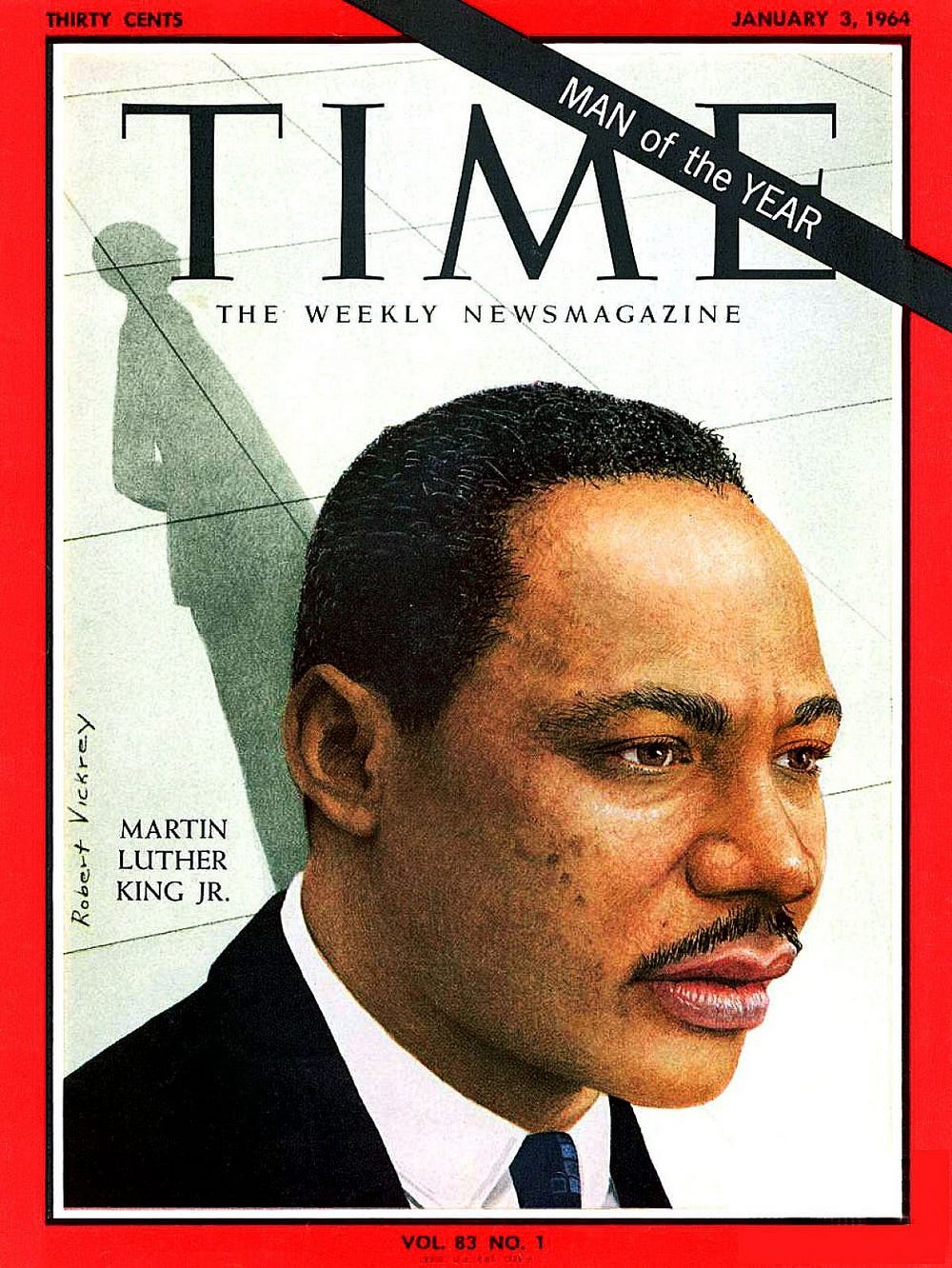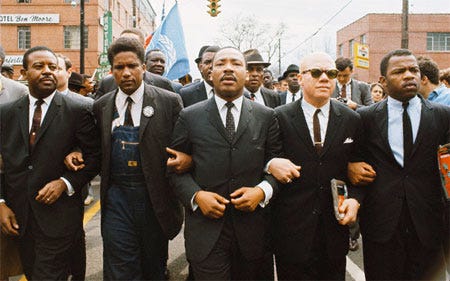(The following is an excerpt from King’s book “Where Do We Go From Here: Chaos or Community” — Part 5 of chapter 5 titled “Where Do We Go”)
There is only one general proposal that I would like to examine here, because it deals with the abolition of poverty within this nation and leads logically to my final discussion of poverty on an international scale.
In the treatment of poverty nationally, one fact stands out: there are twice as many white poor as Negro poor in the United States. Therefore I will not dwell on the experiences of poverty that derived from racial discrimination, I will discuss the poverty that affects white and Negro alike.

Up to recently we have proceeded from a premise that poverty is a consequence of multiple evils: lack of education restricting job opportunities; poor housing which stultified home life and suppressed initiative; fragile family relationships which distorted personality development. The logic of this approach suggested that each of these causes be attacked one by one. Hence a housing program to transform living conditions, improved educational facilities to furnish tools for better job opportunities, and family counseling to create better personal adjustments were designed. In combination these measures were intended to remove the causes of poverty.
While none of these remedies in itself is unsound, all have a fatal disadvantage. The programs have never proceeded on a coordinated basis or similar rates of development. Housing measures have fluctuated at the whims of legislative bodies. They have been piecemeal and pygmy. Educational reforms have been even more sluggish and entangled in bureaucratic stalling and economy-dominated decisions. Family assistance stagnated in neglect and then suddenly was discovered to be the central issue on the basis of hasty and superficial studies. At no time has a total, coordinated and fully adequate program been conceived. As a consequence, fragmentary and spasmodic reforms have failed to reach down to the profoundest needs of the poor.
In addition to the absence of coordination and sufficiency, the programs of the past all have another common failing — they are indirect. Each seeks to solve poverty by first solving something else.
I’m now convinced that the simplest approach will prove to be the most effective — the solution to poverty is to abolish it directly by a now widely discussed measure: the guaranteed income.
Earlier in the century this proposal would have been greeted with ridicule and denunciation as destructive of initiative and responsibility. At that time economic status was considered the measure of the individual’s ability and talents. In the simplistic thinking of that day the absence of worldly goods indicated a want of industrious habits and moral fiber.
We have come a long way in our understanding of human motivation and of the blind operation of our economic system. Now we realize that dislocations in the market operation of our economy and the prevalence of discrimination thrust people to idleness and bind them into constant or frequent unemployment against their will. The poor are less often dismissed from our conscience today by being branded as inferior and incompetent. We also never know that no matter how dynamically the economy develops and expands it does not eliminate all poverty.
We have come to the point where we must make the non-producer a consumer or we will find ourselves else drowning in a sea of consumer goods. We have so energetically mastered production that we now must give attention to distribution. Though there have been increases in purchasing power they have lagged behind behind increases in production. Those at the lowest economic level, the poor white and Negro, the aged and chronically ill, are traditionally unorganized and therefore have little ability to force the necessary growth in their in their income. They stagnate or become even poor poorer in relation to the larger society.
The problem indicates that our emphasis must be twofold. We must create full employment or we must create incomes. People must be made consumers by one method or the other. Once they are placed in this position, we need to be concerned that the potential of the individual is not wasted. New forms of work that enhance the social good will have to be devised for those for him traditional jobs are not available.
In 1879 Henry George anticipated this state of affairs when he wrote, in Progress and Poverty:
“The fact is that the work which improves the condition of mankind, the work which extends knowledge and increases power and enriches literature, and elevates thought, is not done to secure a living. It is not the work of slaves, driven to their task either by the lash of a master or by animal necessities. It is the work of men who perform it for their own sake, and not that they may get more to eat or drink, or wear, or display. In a state of society where want is abolished, work of this sort could be enormously increased.”
We are likely to find that the problems of housing and education, instead of proceeding the elimination of poverty, will themselves be affected if poverty is first abolished. The poor transformed into purchasers will do a great deal on their own to alter housing decay. Negroes, who have a double disability, will have a greater effect on discrimination when they have the additional weapon of cash to use in their struggle.
Beyond these advantages, a host of positive psychological changes inevitably will result from widespread economic security. The dignity of the individual will flourish when the decisions concerning his life are in his own hands, when he has the assurance that his income is stable and certain, and when he knows that he has the means to seek self-improvement. Personal conflicts between husband, wife and children will diminish when the unjust measurement of human worth on a scale of dollars is eliminated.

Two conditions are indispensable if we are to ensure that the guaranteed income operates as a consistently progressive measure. First, it must be pegged to the median income of society, not at the lowest levels of income. To guarantee an income at the floor would simply perpetuate welfare standards and freeze into the society poverty conditions. Second, the guaranteed income must be dynamic; it must automatically increase as the total social income grows. Were it permitted to remain static under growth conditions, the recipients would suffer a relative decline. If periodic reviews disclose that the whole national income has arisen, then the guaranteed income would have to be adjusted upward by the same percentage. Without these safeguards a creeping retrogression would occur, nullifying the gains of security and stability.
The proposal is not a “civil rights” program, in the sense that the term is currently used. The program would benefit all the poor, including the two-thirds of them who are white. I hope that both Negro and white will act in coalition to affect this change, because their combined strength will be necessary to overcome the fierce opposition we must realistically anticipate.
Our nation’s adjustment to a new mode of thinking will be facilitated if we realize that for nearly 40 years two groups in our society have already been enjoying a guaranteed income. Indeed, it is a symptom of our confused social values that these two groups turn out to be the richest and poorest. The wealthy who own securities have always had an assured income; and their polar opposite, the relief client, has been guaranteed an income, however miniscule, through welfare benefits.
John Kenneth Galbraith has estimated that $20 billion a year would effect a guaranteed income, which he describes as “not much more than we will spend the next fiscal year to rescue freedom and democracy and religious liberty as these are defined by ‘experts’ in Vietnam.”
The contemporary tendency in our society is to base our distribution on scarcity, which has vanished, and to compress our abundant condensed into the overfed mouth of the middle and upper class until the gag with superfluity. If democracy is to have breadth of meaning, it is necessary to adjust this inequity. It is not only moral, but it is also intelligent. We are wasting and degrading human life by clinging to archaic thinking.
The curse of poverty has no just of justification in our age. It is socially as cruel and blind as the practice of cannibalism at the dawn of civilization, when men ate each other because they had not yet learned to take food from the soil or to consume the abundant animal life around them. The time has come for us to civilize ourselves by the total, direct and immediate abolition of poverty.
— Martin Luther King Jr. (1968)
Can you believe this was not previously published online? Please help me achieve a basic income on Patreon so I can continue this work to spread awareness of MLK’s largely unknown mission to eliminate poverty with “a GUARANTEED INCOME for all people and all families of our country.”
Matt Orfalea makes videos on Youtube. You can also follow him here on Medium, Twitter, and Facebook. If you feel others would appreciate this post, please share it so more people see it, and support the author on Patreon.